过去完成时过去完成进行时例句
一般过去时,过去进行时和过去完成时

一般过去时1.表过去发生的事情或存在的状态eg Suddenly,the clouds cleared and the rain stopped.2.表过去经常发生的事情eg I was very thin in my childhood.3.带有确定的过去的时间状语eg Did you meet yesterday? He left just now.We often played together when we were children. 我们小时候常在一起玩。
He used to smoke a lot, but he doesn’t now. 他过去经常抽烟,但现在不抽了。
Whenever we were in trouble, he would help us. 每当我们遇到困难,他都会帮助我们。
He said he would wait until they came back.常和一般过去时连用的过去时间状语有:last night (week ,month , year , century , etc.) , yesterday , the day before yesterday , yesterday morning ( afternoon , evening ) , in 1999 , two hours ago ( one week ago , tree years ago , …)等等。
使用一般过去时,在某种意义上说就是要强调动作或状态发生或存在于过去的某个时候。
"过去"的时间概念有两层意思:一是指"现在某个时间"以前的时间;二是指"说话、写文章的那个时间点"以前的时间,注意:用于某些特殊结构中表示现在:It’s time we star ted. 我们该动身了。
I wish I knew his name. 要是我知道他的名字就好了。
完成时的四种时态的基本结构

完成时的四种时态的基本结构完成时态是英语中最常用的时态之一,它表示过去某个时间点或时间段已经完成的动作或状态。
完成时态有四种基本结构,分别是现在完成时、过去完成时、将来完成时和完成进行时。
下面将分别介绍这四种时态的基本结构和用法。
一、现在完成时现在完成时的基本结构是“have/has + 过去分词”,其中have用于第一人称单数、第二人称单数和复数,has用于第三人称单数。
现在完成时表示过去发生的动作或状态对现在造成的影响或结果,常用于以下情况:1. 表示过去发生的动作或状态对现在造成的影响或结果,如:I have lost my keys.(我丢了我的钥匙。
)She has been studying English for five years.(她已经学习英语五年了。
)2. 表示过去发生的动作或状态一直持续到现在,如:I have lived in this city for ten years.(我在这个城市住了十年了。
) He has worked for this company since 2010.(他自2010年以来一直在这家公司工作。
)3. 表示过去发生的动作或状态与现在有关联,如:I have just finished my homework.(我刚刚完成了我的作业。
)She has already left for the airport.(她已经去机场了。
)二、过去完成时过去完成时的基本结构是“had + 过去分词”,表示在过去某个时间点或时间段之前已经完成的动作或状态。
过去完成时常用于以下情况:1. 表示过去某个时间点或时间段之前已经完成的动作或状态,如:I had finished my work before he arrived.(他到达之前我已经完成了我的工作。
)She had lived in Paris for two years before she moved to London.(她在搬到伦敦之前在巴黎住了两年。
英语中过去完成时和过去完成进行时区别用法

过去完成时和过去完成进行时过去完成进行时(Past Perfect Progressive Tense)过去完成式是不能单独用的。
我们用的时候,必须有另一个事件。
也就是说,假如我们有两件事A 和B,两件事都发生在过去,但A 发生在B 以前,A 应该用过去完成式,B 则用过去式。
以下是几个例子:(1)他到台湾以前,曾学过中文。
He had studied Chinese before he came to Taiwan.(2)他念大学以前,曾前工作过。
He had worked before he decided to go to college.(3)我写这篇有关爱尔兰的小说以前,曾去过爱尔兰。
I had been to Ireland before I wrote this book about Ireland's people.(4)我在上大学以前,已经学过微积分。
I had studied calculus before I got into college.(5)周一以前,已经下过雪了。
It had already snowed before Monday.(6)警察到来之前,小偷已经跑了。
When the police arrived, the thieves had already run away.(7)到那时,他的家人已经有半年没有他的消息了。
Until then, his family hadn’t heard from him for 6 months.如果我们要强调较早发生事件的连续性,我们可以用过去完成进行式。
占去完成进行式和现在进行式惟一不同的地方是verb to have 的地方一定要用had 。
以下是一些过去完成进行式的例子:1. I had been watching TV before you called me.2. I had been working hard in a company for many years before I went to college.3. He had been studying before he went to class.4. He had been driving all day before he went to sleep.过去完成时1)概念:表示过去的过去----|-------|-----|---->其构成是had +过去分词构成。
动词时态掌握过去现在和将来的正确用法

动词时态掌握过去现在和将来的正确用法动词时态是语法中一个非常重要的概念,它用来表示动作或状态发生的时间。
正确使用动词时态可以帮助我们准确表达过去、现在和将来的动作,增强语言的准确性和流畅性。
本文将围绕过去、现在和将来的动作分别介绍其正确的时态使用。
过去时态过去时态表示在过去某个时间点或某个时间段发生的动作或状态。
过去时态常用的几种形式包括简单过去时、过去进行时、过去完成时以及过去完成进行时。
1. 简单过去时:动词的过去式形式表示一种已经结束的或持续了一段时间的动作或状态。
例句:I walked to the park yesterday.(昨天我走到了公园。
)例句:She studied hard for the exam last night.(昨晚她为了考试努力学习。
)2. 过去进行时:be动词的过去式加上动词的ing形式表示过去某一时刻或某一段时间里正在进行的动作。
例句:They were playing soccer when it started to rain.(当下雨时他们正在踢足球。
)例句:I was watching TV when she called me.(她给我打电话时我正在看电视。
)3. 过去完成时:had + 过去分词形式表示在过去某个时间点之前已经完成的动作或状态。
例句:They had already left when I arrived.(我到达时他们已经走了。
)例句:She had finished her homework before dinner.(吃晚饭之前她已经完成了作业。
)4. 过去完成进行时:had been + 动词的ing形式表示过去某一时刻之前一直在进行的动作。
例句:He had been studying for hours before he finally took a break.(他在休息之前已经学习了几个小时。
)例句:She had been waiting at the bus stop for 20 minutes before the bus finally arrived.(公交车终于到站时,她在车站等了20分钟。
fall的各种时态的例句

fall的各种时态的例句
1. 现在进行时:I am falling in love with you.(我正在爱上你)
2. 一般现在时:I fall asleep quickly every night.(我每晚都很快入睡)
3. 过去进行时:He was falling down the stairs when I saw him.(当我看到他时,他正在楼梯上摔倒)
4. 一般过去时:She fell off her bike and hurt her knee.(她从自行车上摔下来,弄伤了膝盖)
5. 现在完成时:They have fallen behind in their studies.(他们在学习上落后了)
6. 过去完成时:By the time I arrived, he had already fallen asleep.(我到达时,他已经睡着了)
7. 将来进行时:They will be falling in love with each other when they meet.(当他们见面时,他们将会相爱)
8. 将来完成时:By this time next year, I will have fallen in love with someone special.(到明年这个时候,我会爱上一个特别的人)9. 过去将来时:He said that he would fall in love with her if she asked him out.(他说如果她约他,他会爱上她)
10. 过去完成进行时:They had been falling in love with each other for years before they got married.(他们在结婚前已经相爱了多年)。
英语时态16种基本时态结构
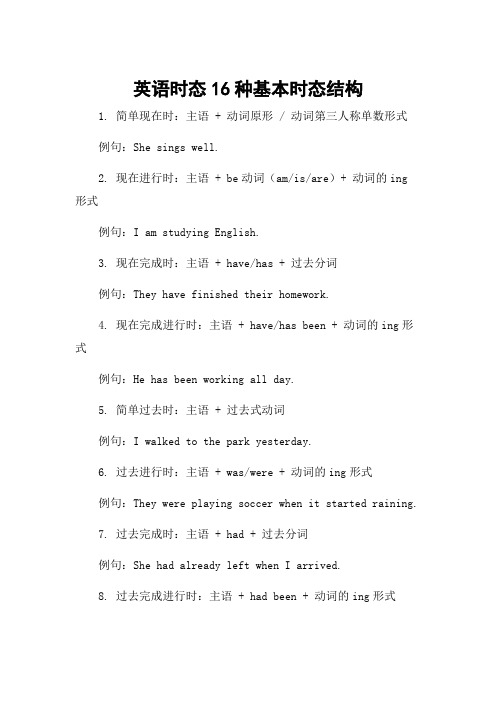
英语时态16种基本时态结构1. 简单现在时:主语 + 动词原形 / 动词第三人称单数形式例句:She sings well.2. 现在进行时:主语 + be动词(am/is/are)+ 动词的ing 形式例句:I am studying English.3. 现在完成时:主语 + have/has + 过去分词例句:They have finished their homework.4. 现在完成进行时:主语 + have/has been + 动词的ing形式例句:He has been working all day.5. 简单过去时:主语 + 过去式动词例句:I walked to the park yesterday.6. 过去进行时:主语 + was/were + 动词的ing形式例句:They were playing soccer when it started raining.7. 过去完成时:主语 + had + 过去分词例句:She had already left when I arrived.8. 过去完成进行时:主语 + had been + 动词的ing形式例句:We had been waiting for hours when the busfinally arrived.9. 一般将来时:主语 + will/shall + 动词原形例句:He will go shopping tomorrow.10. 将来进行时:主语 + will be + 动词的ing形式例句:We will be having dinner at 7 o'clock tomorrow.11. 将来完成时:主语 + will have + 过去分词例句:They will have finished the project by next week.12. 将来完成进行时:主语 + will have been + 动词的ing形式例句:I will have been studying for 5 hours by the time you come.13. 现在完成逻辑时:主语 + should/would + have + 过去分词例句:He should have called the police when he saw the accident.14. 过去完成逻辑时:主语 + should/would + have + 过去分词例句:They would have been late if they hadn't taken a taxi.15. 过去将来逻辑时:主语 + should/would + have + 过去分词例句:I thought he would have arrived by now.16. 过去将来完成逻辑时:主语 + should/would + have + 过去分词例句:She said she would have finished the report by tomorrow.。
过去进行时和过去完成时的区别

过去进行时和过去完成时的区别过去进行时和过去完成时是英语中两种表示过去时间的时态。
虽然它们都涉及到过去的事件,但它们的用法和表示的意义有所不同。
过去进行时 (Past Continuous)过去进行时(Past Continuous)用于描述过去某个时间点或某个时间段内正在进行的动作或事件。
它通常由"was/were + 现在分词"构成。
以下是一些使用过去进行时的例子:1. She was studying when I called her.(当我给她打电话时,她正在研究。
)2. They were playing football in the park yesterday.(他们昨天在公园里踢足球。
)3. I was cooking dinner at 7 o'clock last night.(昨晚7点我在做晚饭。
)过去进行时强调过去某个时刻或某个时间段内正在进行的动作,通常与其他过去时态连用以描述同时发生的事件。
过去完成时 (Past Perfect)过去完成时(Past Perfect)用于描述在过去某个时间点之前已经发生或完成的动作或事件。
它通常由"had + 过去分词"构成。
以下是一些使用过去完成时的例子:1. I had already finished my work before he arrived.(在他到达之前,我已经完成了我的工作。
)2. She had lived in that city for five years before moving to her hometown.(在搬回她的故乡之前,她在那个城市已经住了五年。
)3. They had already left when we arrived at the party.(当我们到达派对时,他们已经走了。
)过去完成时强调过去某个时间点之前已经完成的动作或事件,常与其他过去时态连用以表示先后顺序。
英语八大时态总结表

英语八大时态总结表英语语态有八种:一般现在时、一般过去时、一般将来时、现在进行时、过去进行时、将来进行时、现在完成时和过去完成时。
一般现在时:表示经常、习惯性的动作或状态,或通常情况。
例句:I usually wake up at 6 o'clock in the morning.(我通常在早上6点醒来。
)一般过去时:表示过去某个时候发生的动作或状态。
例句:Yesterday, I went to the park with my friends.(昨天,我和我的朋友一起去了公园。
)一般将来时:表示将要发生的动作或状态。
例句:I will go to the concert tomorrow night.(我明晚将去听音乐会。
)现在进行时:表示正在进行的动作或状态。
例句:I am watching TV.(我正在看电视。
)过去进行时:表示在过去某个时间点正在进行的动作。
例句:At 8 o'clock last night, I was watching TV.(昨晚8点,我正在看电视。
)将来进行时:表示在将来某个时间点正在进行的动作。
例句:Tomorrow at 8 o'clock in the evening, Iwill be watching TV.(明天晚上8点,我将会正在看电视。
)现在完成时:表示过去某个时间点开始一直持续到现在的动作或状态。
例句:I have lived in this city for 5 years.(我已经在这个城市住了5年了。
)过去完成时:表示过去某个时间点之前已经完成的动作或状态。
例句:By the time I arrived, they had already left.(我到达的时候,他们已经离开了。
)以上八种语态使用灵活,掌握好各个语态的用法,能够更好地表达自己的意思。
过去完成时与过去完成进行时的区别

过去完成时与过去完成进行时的区别过去完成时和过去完成进行时是英语中表示过去的两种时态,它们在用法和含义上有一定的差异。
本文将详细介绍这两个时态的区别和使用方法。
一、过去完成时(Past Perfect)过去完成时表示在过去某一时间或事件之前已经完成的动作或状态。
它的构成是由had + 过去分词组成,用于强调过去的先后关系。
例如:1. They had already left when I arrived.(当我到达时,他们已经离开了。
)2. She had finished her homework by the time her friend called.(她的朋友打电话时,她已经完成了作业。
)通过以上例子可以看出,过去完成时常常与过去某时刻或事件相连,表示在这一时刻或事件之前已经完成的动作。
二、过去完成进行时(Past Perfect Continuous)过去完成进行时表示过去开始并一直持续到另一个过去时间点或事件的动作或状态。
它的构成是由had been + 动词-ing形式组成。
例如:1. He had been studying English for two hours before he took a break.(他休息前已经学了两个小时英语。
)2. They had been waiting for the bus for half an hour when it finally arrived.(当公交车终于来了时,他们已经等了半个小时。
)通过以上例子可以看出,过去完成进行时强调的是一个动作或状态在过去的时间段内一直持续进行。
三、区别与比较1. 时间范围不同:过去完成时强调的是在过去某一时间点或事件之前的动作或状态,即过去的过去。
而过去完成进行时强调的是过去某一时间段内的持续状态或动作。
2. 表达方式不同:过去完成时使用had + 过去分词,强调动作的完成。
而过去完成进行时使用had been + 动词-ing形式,强调动作的持续性。
过去完成时与过去完成进行时在时间状语从句中的用法

过去完成时与过去完成进行时在时间状语从句中的用法过去完成时和过去完成进行时是英语中两种表示过去的完整性或连续性的时态。
它们通常在复杂句中的时间状语从句中使用,用于进一步强调动作的完成或持续发生的时间。
本文将详细介绍这两种时态在时间状语从句中的用法。
过去完成时的用法过去完成时用来表示在过去某个时间点之前已经完成的动作或事件。
通常我们会在时间状语从句中使用过去完成时来描述主句中的动作发生之前的情况。
下面是一些使用过去完成时的例子:1. She had already cooked dinner when I arrived home.(当我到家时,她已经做好了晚饭。
)2. They had finished their work before the boss came.(老板来之前,他们已经完成了工作。
)3. He had studied English for two years before he moved to the United States.(在他搬到美国之前,他已经学了两年英语。
)从以上例子可以看出,在时间状语从句中,动作的完成发生在主句中谓语动词表示的动作之前。
过去完成时用于强调主句中动作发生之前的时间先后关系。
过去完成进行时的用法过去完成进行时表示过去某个时间之前一直在进行的动作或事件。
它结合了过去完成时的完成性和进行时的持续性。
在时间状语从句中,我们使用过去完成进行时来描述主句中的动作过去某一时间点之前正在持续发生的情况。
下面是一些使用过去完成进行时的例子:1. She had been waiting for me for over an hour when I finally arrived.(我最后到达的时候,她已经等了我一个多小时了。
)2. They had been working on the project for months before they finally finished it.(他们最终完成之前,他们已经在这个项目上工作了几个月了。
一般过去时,过去进行时和过去完成时
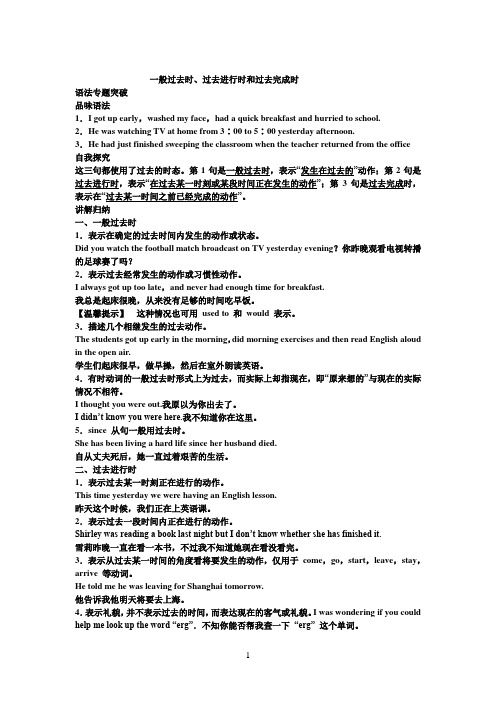
一般过去时、过去进行时和过去完成时语法专题突破品味语法1.I got up early,washed my face,had a quick breakfast and hurried to school.2.He was watching TV at home from 3∶00 to 5∶00 yesterday afternoon.3.He had just finished sweeping the classroom when the teacher returned from the office自我探究这三句都使用了过去的时态。
第1句是一般过去时,表示“发生在过去的”动作;第2句是过去进行时,表示“在过去某一时刻或某段时间正在发生的动作”;第3句是过去完成时,表示在“过去某一时间之前已经完成的动作”。
讲解归纳一、一般过去时1.表示在确定的过去时间内发生的动作或状态。
Did you watch the football match broadcast on TV yesterday evening?你昨晚观看电视转播的足球赛了吗?2.表示过去经常发生的动作或习惯性动作。
I always got up too late,and never had enough time for breakfast.我总是起床很晚,从来没有足够的时间吃早饭。
【温馨提示】这种情况也可用used to 和would 表示。
3.描述几个相继发生的过去动作。
The students got up early in the morning,did morning exercises and then read English aloud in the open air.学生们起床很早,做早操,然后在室外朗读英语。
4.有时动词的一般过去时形式上为过去,而实际上却指现在,即“原来想的”与现在的实际情况不相符。
I thought you were out.我原以为你出去了。
根据英语过去完成时的与其他时态的连用总结

根据英语过去完成时的与其他时态的连用总结英语中的过去完成时是表示过去某一时间或动作之前已经发生或完成的动作或状态。
它通常和其他时态相连用,以表达更加清晰和准确的时间关系。
下面是过去完成时与其他时态的常见连用情况总结:1. 过去完成时与一般过去时连用:在过去某一时间点之前完成的动作,通常使用过去完成时与一般过去时连用。
例如:- He had already finished his homework when I arrived. (当我到达时,他已经完成了他的作业。
)- By the time she woke up, he had already left.(她醒来时,他已经离开了。
)2. 过去完成时与过去进行时连用:过去完成时与过去进行时连用可以表示在过去某一时间之前正在进行的动作。
例如:- I had been studying Chinese for three years before I moved to China.(在我搬到中国之前,我已经研究了三年的中文。
)- They had been waiting for two hours when the train finally arrived.(火车终于到达时,他们已经等了两个小时了。
)3. 过去完成时与过去完成进行时连用:过去完成时与过去完成进行时连用可以表示在过去某一时间之前一直持续进行的动作。
例如:- She had been working as a teacher for five years before she became a lawyer.(在她成为律师之前,她一直从事教师工作已经五年了。
)- They had been living in New York since 2005 before they moved to Los Angeles.(他们在搬到洛杉矶之前一直住在纽约自2005年起。
)总结:过去完成时与其他时态的连用可以帮助表达清晰的时间关系,强调动作的先后顺序。
过去进行时和过去完成时

Kevin Zhang 新概念第一册:117/118过去进行时和过去完成时 过去进行时:表示在过去某个时间点或者时间段,正在发生的事情。
一、用在简单句中主语 + was/were doing (动词进行时) + 特定时间状语 1. I was sleeping at eight o'clock yesterday morning. 2. --what were you doing at this time last night? --I was playing the piano. 3. It was raining all night/day yesterday.二、用在时间状语从句中:用when, while 等词连接两个句子。
对主句和从句的两种动作做比较,时间持续长的动作用进行时,短暂动作用过去时。
★When/While/Just as + 主语 + was/were doing ,主语)从句:进行动作 主句:短暂动作When I was watering the garden, it began to rain.While/Just as I was leaving the house, the phone rang.★When + 主语+ did (动词过去时),主语 + was/were doing从句:短暂动作 主句:进行动作When I went to visit her, she was picking apples in the garden.★When/While/Just as + 主语 + was/were doing ,主语从句:进行动作 主句:进行动作While my father was watching TV , my mother was cooking.--------------------------------------------------------------------------------------------------------------------- 过去完成时:表示两个事件中,过去一个动作开始之前,另一个动作已经完成。
英语语法 过去完成时和过去完成进行时知识点比较
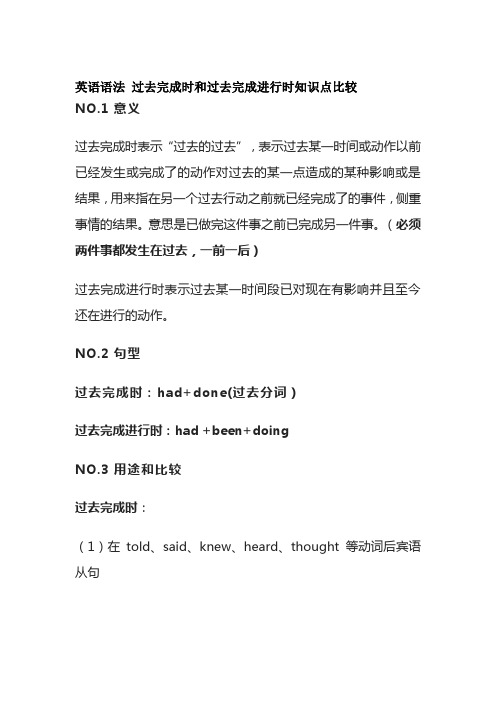
英语语法过去完成时和过去完成进行时知识点比较NO.1 意义过去完成时表示“过去的过去”,表示过去某一时间或动作以前已经发生或完成了的动作对过去的某一点造成的某种影响或是结果,用来指在另一个过去行动之前就已经完成了的事件,侧重事情的结果。
意思是已做完这件事之前已完成另一件事。
(必须两件事都发生在过去,一前一后)过去完成进行时表示过去某一时间段已对现在有影响并且至今还在进行的动作。
NO.2 句型过去完成时:had+done(过去分词)过去完成进行时:had +been+doingNO.3 用途和比较过去完成时:(1)在told、said、knew、heard、thought 等动词后宾语从句eg: She said that she had finished hishomework until her mum came back.她说她在她妈妈回来之前已经完成作业。
(2)作状语从句在过去不同时间段发生两个动作,发生在前,用过去完成时; 发生在后,用一般过去时。
eg: When I arrived, the train had left.当我到了,火车已经开了。
(3)表示意向,如“hope,wish,expect,think,intend,mean,suppose”等,用过去完成时表示“原本....,本能...."eg: We had hoped that you would come,but you didn't.我们希望你能来,但你没来(4)过去完成时的时间状语before,by, until,when, after, once, as soon aseg: He said that he had learned art before.他说他以前会学好艺术。
过去完成进行时:(1)表示到现在还尚未完成eg: He had been writing the novel.他还在写小说(2)企图eg: He had been studying English他仍在学习英语(3)未得结果eg: We had been studying what the teacher said.我们仍在学习老师教的知识(表示还没懂)(4)反复动作eg:He had been asking me the same question (很多次)他问过我很多相似的问题(5)情绪what had he been doing?(不耐烦)他在做什么?NO.4 理解过去完成时:句子中普遍存在过去式,两件事情都发生在过去,一前一后,强调结果过去完成进行时:时态少用,但经常强调事情对现在的影响。
过去完成时与过去完成进行时在时间状语从句中的特殊用法和语气表达方式
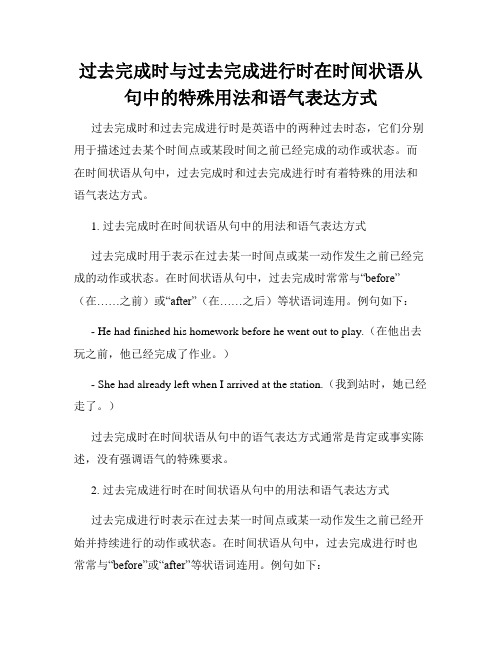
过去完成时与过去完成进行时在时间状语从句中的特殊用法和语气表达方式过去完成时和过去完成进行时是英语中的两种过去时态,它们分别用于描述过去某个时间点或某段时间之前已经完成的动作或状态。
而在时间状语从句中,过去完成时和过去完成进行时有着特殊的用法和语气表达方式。
1. 过去完成时在时间状语从句中的用法和语气表达方式过去完成时用于表示在过去某一时间点或某一动作发生之前已经完成的动作或状态。
在时间状语从句中,过去完成时常常与“before”(在……之前)或“after”(在……之后)等状语词连用。
例句如下:- He had finished his homework before he went out to play.(在他出去玩之前,他已经完成了作业。
)- She had already left when I arrived at the station.(我到站时,她已经走了。
)过去完成时在时间状语从句中的语气表达方式通常是肯定或事实陈述,没有强调语气的特殊要求。
2. 过去完成进行时在时间状语从句中的用法和语气表达方式过去完成进行时表示在过去某一时间点或某一动作发生之前已经开始并持续进行的动作或状态。
在时间状语从句中,过去完成进行时也常常与“before”或“after”等状语词连用。
例句如下:- He had been studying for two hours before he finally went to bed.(他终于上床睡觉之前已经学习了两个小时。
)- The team had been practicing for weeks after the coach left.(教练离开后,这个队已经练习了几个星期。
)过去完成进行时在时间状语从句中的语气表达方式可以表示某种关于过去动作的推测、假设或让步等含义。
常用的语气词包括“maybe”(也许)、“perhaps”(也许)、“probably”(大概)、“though”(虽然)等。
一般过去时,过去进行时和过去完成时
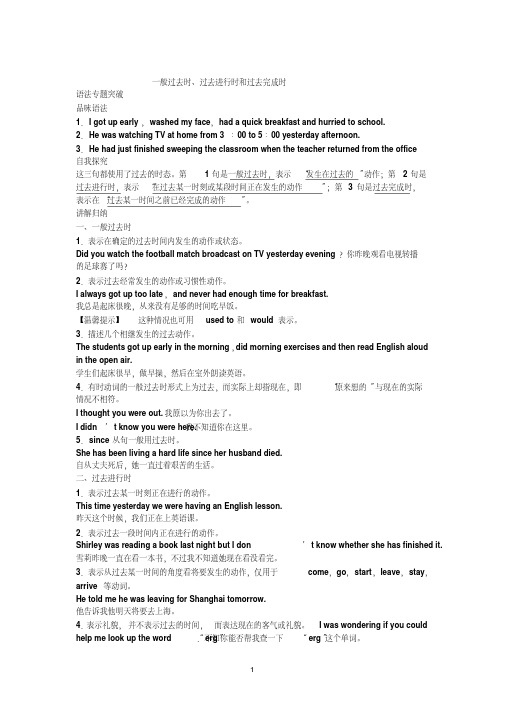
一般过去时、过去进行时和过去完成时语法专题突破品味语法1.I got up early,washed my face,had a quick breakfast and hurried to school.2.He was watching TV at home from 3∶00 to 5∶00 yesterday afternoon.3.He had just finished sweeping the classroom when the teacher returned from the office自我探究这三句都使用了过去的时态。
第1句是一般过去时,表示“发生在过去的”动作;第2句是过去进行时,表示“在过去某一时刻或某段时间正在发生的动作”;第3句是过去完成时,表示在“过去某一时间之前已经完成的动作”。
讲解归纳一、一般过去时1.表示在确定的过去时间内发生的动作或状态。
Did you watch the football match broadcast on TV yesterday evening?你昨晚观看电视转播的足球赛了吗?2.表示过去经常发生的动作或习惯性动作。
I always got up too late,and never had enough time for breakfast.我总是起床很晚,从来没有足够的时间吃早饭。
【温馨提示】这种情况也可用used to 和would 表示。
3.描述几个相继发生的过去动作。
The students got up early in the morning,did morning exercises and then read English aloudin the open air.学生们起床很早,做早操,然后在室外朗读英语。
4.有时动词的一般过去时形式上为过去,而实际上却指现在,即“原来想的”与现在的实际情况不相符。
I thought you were out.我原以为你出去了。
- 1、下载文档前请自行甄别文档内容的完整性,平台不提供额外的编辑、内容补充、找答案等附加服务。
- 2、"仅部分预览"的文档,不可在线预览部分如存在完整性等问题,可反馈申请退款(可完整预览的文档不适用该条件!)。
- 3、如文档侵犯您的权益,请联系客服反馈,我们会尽快为您处理(人工客服工作时间:9:00-18:30)。
Past perfect tense:
1. They had already had breakfast before they arrived at the hotel.
2. She had finished writing the composition by 10 :00 this morning.
3. He told me that there had been an argument between them
4. And this semester, we have learned the past tense, the past perfect tense and the future tense and so on.
5. They said that production costs had been reduced.
6. All the tickets had been sold out when they arrived.
7. We had hardly reached the school before it began to rain.
8. By the time I got to the bus stop , the bus had already left .
9. Eric died a few days ago and these years, he had lived as
a recluse.
10. He died, though great efforts had been made to save his life.
11. We had learned over two thousand English words by the end of last term.
12. They had planted six hundred trees before last Wednesday.
13. Before she came to China, Grace had taught English in
a middle school for about five years.
14. I had learned 1000 English words till then.
15 . They had arrived at the station by ten yesterday.
BM1014
Kim
Past perfect continuous tense:
1. I had only been reading a few minutes when he came in.
2. She had only been reviewing her lessons for a short while when her little sister interrupted her.
3. When the police arrived, the thieves had run away.
4. She had been suffering from a bad cold when she took the exam.
5. Rafael was scolded even though he hadn't been doing anything wrong.
6.Had they been expecting the news for some time?
7.I had been looking for it for days before I found it.
8.He had been mentioning your name to me.
9.I asked where they had been staying all those days.
10.She had been cleaning the office, so we had to wait outside.
11.Had they been expecting the news for some time?
12.I had been waiting for her before she came in.
13.She had been loving Kim deeply when Kim died.
14.I had been reading the absorbing book when a ball hit my head.
15.I had been imagining the bright future before the harsh reality beat me.
BM1014
Kim。
